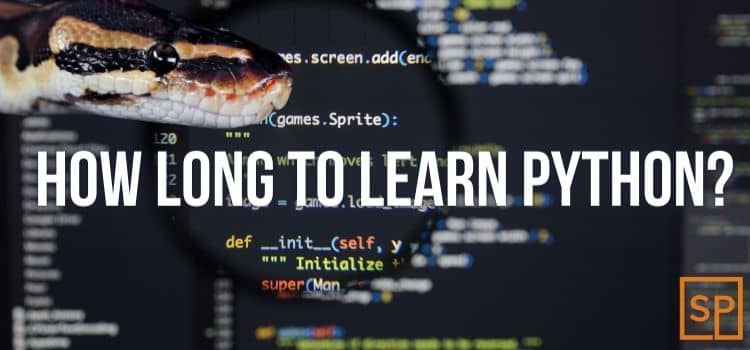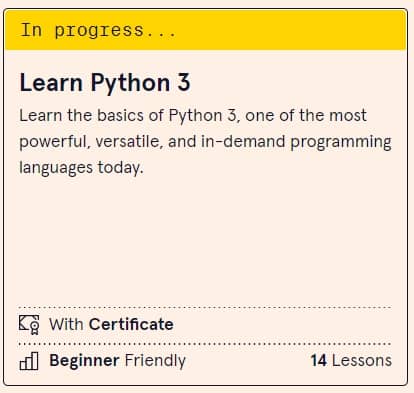If you’re looking to learn Python – know that you’ve picked a worthwhile goal.
Here’s why:
- Python is the currently most in-demand programming language (with almost 70,000 job openings)
- Python has many highly relevant applications today, such as Web Development, Game Development, Data Science, Machine Learning, and more.
- It is one of the easiest – and quickest – languages you can learn.
Which brings us to the question of how long you’ll actually have to spend to become competent in Python programming.

Different levels of skill with Python will take you relatively less or more time to achieve.
In this article, I’ll give you timelines for:
- Mastering the fundamentals,
- Calling yourself a Python Developer,
- Learning Data Science with Python,
- Being qualified enough to get one of those 70,000 jobs in Python development.
How much time you’ll spend learning Python to each level of skill
Note: Most of these timespans build on each other, so you’ll need to add them up. To be job-ready, for example, you’ll need to do all prior steps first, then prepare for your interview.

1-2 weeks / 25 total hours – Learning the fundamentals with a guided resource
As a newbie to Python programming, it’s important not to let yourself become overwhelmed by all the info out there. Because that could make you give up after a few days (or even hours) of trying to make sense of it all.
Which is why I recommend you enroll in a smartly structured Python course. One where you simply need to follow the roadmap that’s laid out by the course, et voilá – you’ve just conquered the biggest obstacle: Learning the basics of the language in the first place.
Learning the 101 of Python doesn’t have to take long. Codecademy’s popular course Learn Python 3, for example, will only take around 25 hours of study until you’re versed in Python’s foundational syntax and elements.
9 weeks / 200 hours – Further studying Python programming concepts
If all you wanted was dip in your toes and learn the basics, you can stop right there after those 25 hours of study.
More likely, though, you’ll want to go further and up your skills even more, right?
These are your next steps, and the minimum time you’ll need to complete them:
- 120 hours (~5 weeks @ 4 hours/6x weekly): Mastering all Data Structures such as sets, stacks, queues, dictionaries and tuples
- 80 hours (~3-4 weeks): Studying programming concepts like object-oriented programming, properties, data types, exceptions and libraries
2-4 weeks / 50-100 hours – Creating a simple software in Python
It’s about time to put your hard-earned Python skills to the test in the real world.
Also, while you’re developing your app, do keep learning. Take the time to consult additional resources for Python. Study free documentation and tutorials, as well as Python books and advanced courses. Let whatever you need for your software dictate what you’ll learn next.
Once you’ve finished building your own application in Python, you’ll have earned the right to call yourself a legit Python Developer.
6 weeks / 150 hours – Learning Data Analysis / Data Science
Data Analysis is a major use case for the Python language. Python is simple and powerful for creating, manipulating and visualizing data. If you ever want to work with data in your own projects, or even aspire to a career as a Data Analyst or Data Scientist, learning how to use Python for these applications is your best bet.
While the subject might seem daunting to you at first, if you put in the time required to learn the necessary algorithms, math concepts, and Python libraries & commands, you too will be able to create your own analyses and data visualizations using Python.
There’s also plenty of good online courses available teaching you Python for Data Analysis and Data Science.
4 weeks / 100 hours – Mastering advanced Python
To continue your journey to learning Python fully, start studying advanced Python concepts such as:
- Recursive Functions
- Generators
- Logging
- Testing
- Functional Programming
- Database Operations
- Concurrent Programming
- Deployment
Using the expertise you’ve built up over 500+ hours so far (as well as possibly some advanced Python resources), it’ll still take you at least 100 hours to understand and learn to apply advanced Python concepts.
6 weeks / 150 hours – Becoming job-ready
For your job interview as a Python Developer, you’ll want to:
- Get your Data Structures & Algorithms knowledge to expert level.
- Practice solving DSA coding questions using Python
- Refresh your general knowledge of language concepts and features
You should calculate 150 hours at the very least to accomplish this. As you get into your prep, you might discover weaknesses in your Python skills – then you’ll want to budget even more time to keep drilling on them.
FAQ
Can I learn Python in 3 months?
It’s possible to reach some level of proficiency in Python programming within 3 months. You won’t become an expert Python developer in that amount of time, but with many hours of practice per day, you can master the fundamentals and build decent intermediate skills in those 12 weeks.
Can I learn Python in 2 months?
2 months is enough time to learn the basics of Python if you’re just starting out. You’ll be able to read and understand much of Python code, and write your own scripts to create your first simple applications. But it’s impossible to become an expert in Python within just 2 months.
Can I learn Python in a week?
You can’t learn Python to a high level in just one week. What you can do is learn how to install the Python source and libraries, as well as create simple outputs on the screen, like “Hello World”. If you need basic scripts to perform a straightforward operation on your website, for example, you might manage to learn enough Python to do it within a week.
How many hours to learn Python?
It takes only a few hours to learn to print “Hello World” to the screen in Python. To get a good grasp of the language basics, expect to spend at least 25 hours. If your goal is to get a job as a Python developer, you’ll need to invest at least 700 hours into learning Python at an advanced level.
How many hours per day does it take to learn Python?
To learn the very basics of Python, 2 hours per day for two weeks can be enough. Considering it takes 500+ hours to reach a somewhat advanced level, though, you’ll have to study Python for 4 hours per day for 5 months to get there.
How long to learn Python for Data Analysis?
To learn the basics of Data Analysis with Python, you should budget around 20 hours if you already have a good grasp on the language itself. Is your goal to get to a more advanced level in Python-powered Data Analysis and Data Science, calculate at least 150 hours of deep study.
How much time does it take to learn advanced Python?
Some courses on advanced Python concepts span only around 10-15 hours – which is good to get an overview. To deeply learn and master advanced Python, though, you’ll be looking at 100+ hours spent.
How much time does it take to learn Python fully?
While it could be argued it’s impossible to learn any programming language completely, to get to the highest level in Python programming, plan to spend between 700 and several thousand hours studying Python inside out, as well as practically applying your learnings every step of the way.

